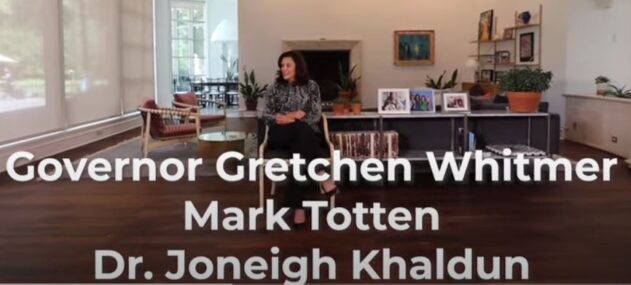
Whitmer: 2021 budget focused on education and healthy families

|


|


FOR IMMEDIATE RELEASE September 22, 2020 Contact: Press@michigan.gov
Governor Whitmer Proclaims This Week as Small Business Week in Michigan The governor calls on the president and Mitch McConnell to pass a COVID-19 recovery package to help Michigan’s small business
LANSING, Mich. — Today, Governor Whitmer proclaimed September 20 – September 26, 2020 as Michigan Small Business Week to recognize the thousands of small business across the state that keep Michigan’s economy strong and our communities united.
“The COVID-19 pandemic has hurt small business owners everywhere who have spent their lives building their businesses. While we have been able to secure small business loans for people across Michigan, there is still more work to do to ensure they have the support they need to get through this pandemic. We need the president and Mitch McConnell to work across the aisle on a bipartisan recovery package that includes support for families and small business owners,” said Governor Whitmer. “When our local businesses thrive so do our communities, families, schools, and economy. I hope this week will serve as a reminder of the positive impact small businesses have on our state. I encourage us all to do our part by shopping local now and throughout the year.
In Michigan, small businesses comprise over 98% of Michigan businesses and employ half of Michigan workers. Additionally, for every $100 spent at a local business, roughly $68 stays in the local economy, allowing both business and job growth.
Throughout the COVID-19 pandemic, Governor Whitmer and the Michigan Economic Development Corporation (MEDC) have worked together to leverage federal CARES Act funding to provide economic support to entrepreneurs, workers and communities in all 83 counties through the Michigan Small Business Restart Grant program ($100 million) and Michigan Agricultural Safety Grant program ($15 million). As part of the Michigan Small Business Restart Grant we have ensured that at least 30% of these funds will support women-, minority- or veteran-owned businesses around the state
“By collaborating with local partners and our partner agencies across state government, we have been able to deliver vital financial resources to small businesses across Michigan to create a path for economic recovery here in our state,” said Mark A. Burton, CEO of the MEDC. “We will continue to work closely with our small business community to ensure they have the opportunity to not only survive, but thrive, in Michigan long term.”
Since March, MEDC launched 19 COVID-19 response programs, that are anticipated to support more than 10,000 businesses throughout the state by the end of the year, while retaining 21,000 jobs. Additionally, 42% of support has gone to businesses in historically disadvantaged communities. Learn more at michiganbusiness.org/
|


|
FOR IMMEDIATE RELEASE TUESDAY, SEPTEMBER 22, 2020 CONTACT: James Fults, MDOT Workforce Programs and Recruitment Unit Manager, 517-230-8004, FultsJ@Michigan.gov MDOT is hiring!Learn more at Oct. 6 virtual career fairFast facts:
September 22, 2020 — The Michigan Department of Transportation (MDOT) is hosting a virtual career fair 6:30-8 p.m. Tuesday, Oct. 6, to help fill a number of seasonal and permanent positions. MDOT has partnered with the Michigan Department of Labor and Economic Opportunity to give prospective candidates a chance to engage with MDOT staff, ask questions, and learn about current and future career opportunities through chat and video conversations. The department is currently in need of more than 100 limited-term, winter maintenance workers in all regions of the state. The minimum requirement for these positions is a valid Michigan Class B CDL. All other training will be provided. This is a great entry point into the department and could lead to future full-time opportunities. Other available positions include electricians, internships (including veterans, engineering, and Transportation Diversity Recruitment Program positions), transportation engineers, transportation maintenance workers (seasonal and full-time), transportation planners, transportation technicians, and other skilled trades and professional positions. Interested candidates are encouraged to look over current positions as new ones are being posted each day at www.Michigan.gov/MDOTJobs. The virtual career fair is open to all experience levels. Hiring requirements are based upon the individual position. For more information, contact MDOT Workforce Programs and Recruitment Unit Manager James Fults at MDOT-Recruitment@Michigan.gov.
|


|